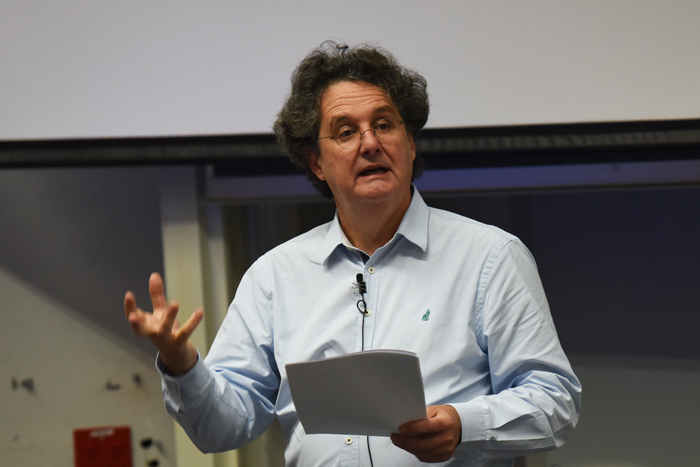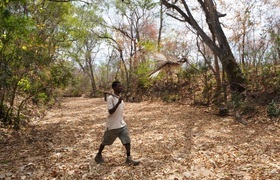Journalism under fire
26 January 2016 | Story by Newsroom
Many of our newspapers are failing us as citizens and failing our democracy, says Wits Professor of Journalism Anton Harber. He was speaking at a Summer School lecture on threats facing independent journalism in South Africa.
Anton Harber, Caxton Professor of Journalism at Wits and Chair of the Freedom of Expression Institute, describes himself as a “short-term pessimist and long-term optimist”.
And his view of the short-term future of independent journalism in South Africa is very firmly in the pessimistic frame.
“I think we can all agree, whatever one's political affiliations, that our country is in a difficult phase and that this phase is going to last a good few years. For me what determines how we come out the other end – whether we emerge as a healthy, thriving democracy depends largely on whether we can nurture, protect and develop institutions of accountability, such as the judiciary, parliament, and the media, private media in particular,” he told the audience.
Who pays?
Kicking off his lecture with a clip from Monty Python and the Holy Grail, Harber likened the state of South African journalism to the incapacitated Black Knight after a fight with King Arthur – without arms or legs but still railing against his opponent.
He said while only a few years ago, newspapers had been trendsetters, they were now mostly “sclerotic” and “dull”.
Using the example of the recent #FeesMustFall protests at Wits, he said the liveliest coverage had been on Twitter and a small website called the Daily Vox, which was run by one woman and her friends.
“You could follow it live…not just what was happening as it happened but what the protagonists were experiencing in their own words.” By contrast, other traditional media viewpoints came “many, many hours later” and most read it wrong.
Nevertheless, what happened on social media was not “what we know as journalism”, which was a process of researching, investigating, selecting, verifying, balancing, and editing text into a good and trustworthy read.
And for independent journalism to happen, somebody needed to pay for it.
Twin challenges
This pointed to two broad challenges: First, the global collapse of the international business model for paid journalism as advertisers migrated online; second, and more specifically, the political challenges facing South African media.
“Obviously these issues are intermittently intertwined as a media under financial pressure is one that is particularly vulnerable to political manipulation and pressure,” he added.
The revenue pressures had resulted in shrinking newsrooms, particularly the loss of more “expensive” specialists; among these investigative reporters, as well as a breakdown of the barriers that protected journalists from the influence of advertisers.
Revenue pressures had also led to a rise in populism and its digital equivalent of click baiting.
But while the rise of tabloids had revived newspaper markets, it hid the fact that all the other titles were either stagnating or shrinking.
In the last 18 months, all newspapers in the country had started to show dramatic losses in readership. Examples were The Star, which at its peak sold 210 000 copies a day and was now down to 84 000, the Daily Sun, down from 500 000 to 260 000, and the Mail & Guardian, which had dropped from a high of 50 000 to below 30 000.
Three phases
In terms of the political backdrop, he pointed out that the ANC had gone through three phases in its relationship with local media since its return to the country in 1990.
At first it had a very open media policy, which had led to something of a flowering of investigative reporting while the country enjoyed “an extraordinary level of media freedom”.
These were the “halcyon days” when journalism operated largely without threat “even when it lambasted the ruling party”, he said.
The second phase was when the ANC became fed up with the scrutiny from a “quite hostile” newspaper sector, which led to a call for a statutory media tribunal and the drafting of the so-called Secrecy Bill.
These measures were essentially “crude and unworkable” and had run into strong opposition, including Cosatu within the alliance. They would also probably not pass constitutional muster.
Consequently, more recently the ruling party had adopted a new, subtler strategy, which operated largely below the radar, he said.
“I think the ANC saw how it could use its political power, economic influence and access to state resources to support more friendly media and put a squeeze on those most critical.”
This pattern of “backdoor influence” had profound implications for independent journalism.
Harber said while the South African media could be noisy and the debate could be raucous, its current state was like that of the Black Knight in Monty Python – “without limbs to do the job at hand”.
“That is why private media is so important. It is one of the very few powerful institutions of accountability outside of direct state control. For me it has a special role when other institutions of accountability are under pressure.”
But for private media to thrive, it would take “ "a lot of defending, a lot of adjustment, a lot of manoeuvring, a lot of fights to preserve that free speech space”, he added.
Story by Andrea Weiss. Photo by Michael Hammond.
 This work is licensed under a Creative Commons Attribution-NoDerivatives 4.0 International License.
This work is licensed under a Creative Commons Attribution-NoDerivatives 4.0 International License.
Please view the republishing articles page for more information.










